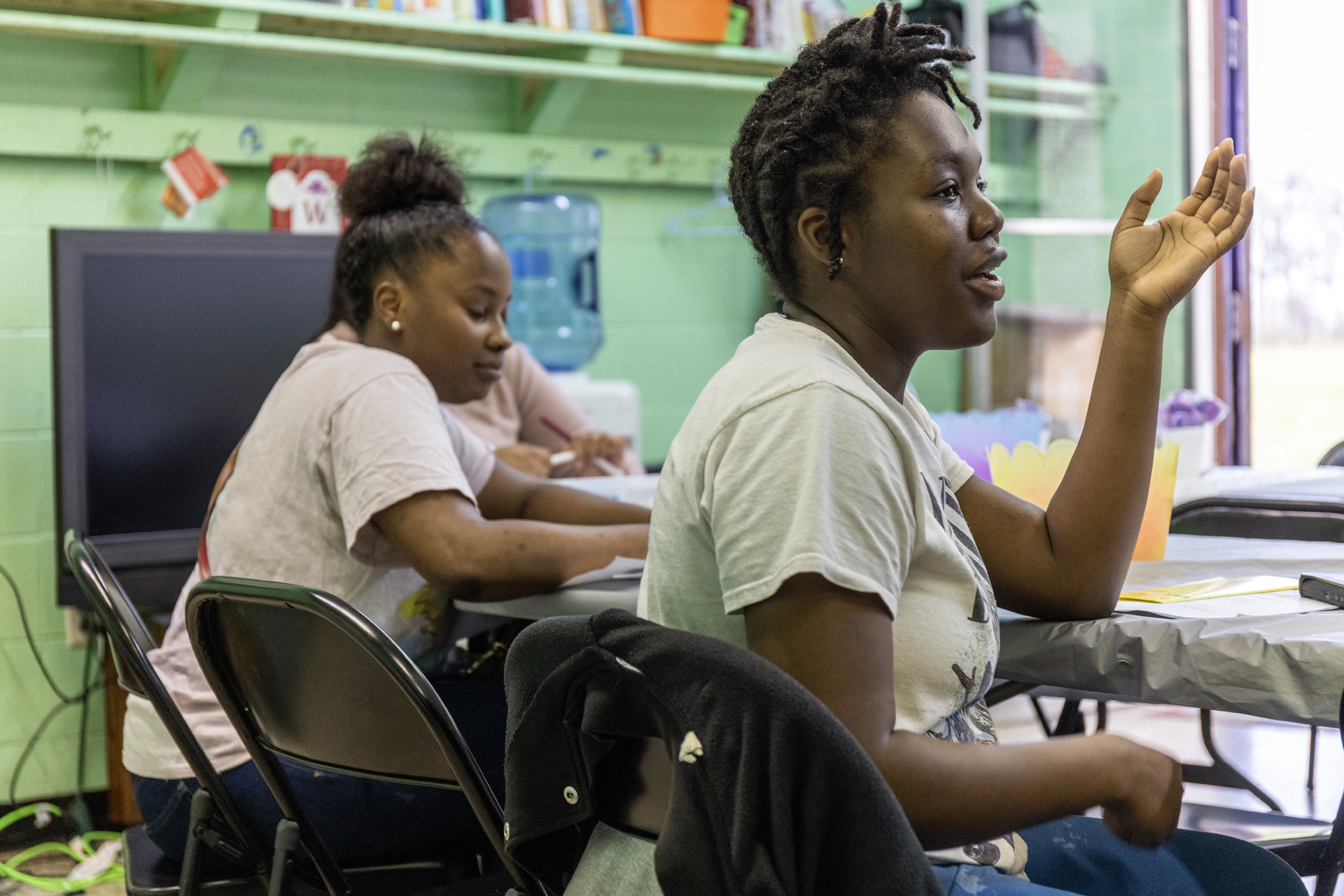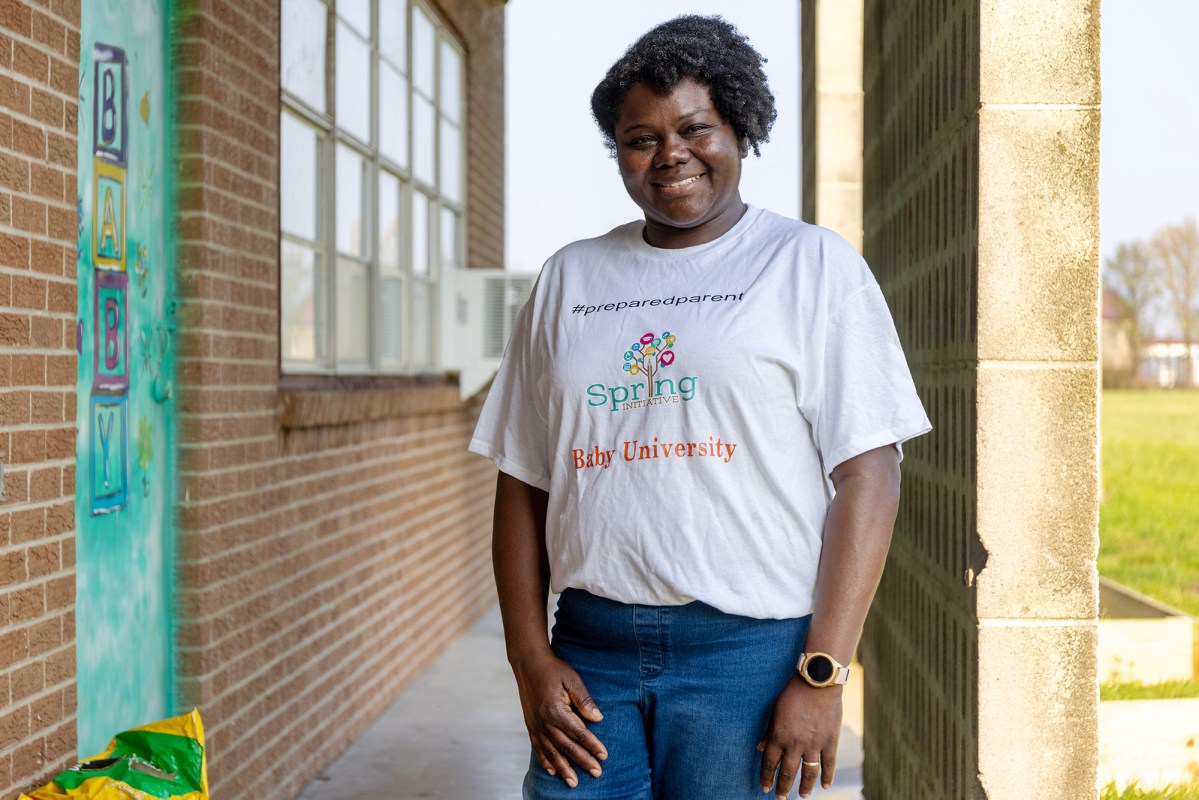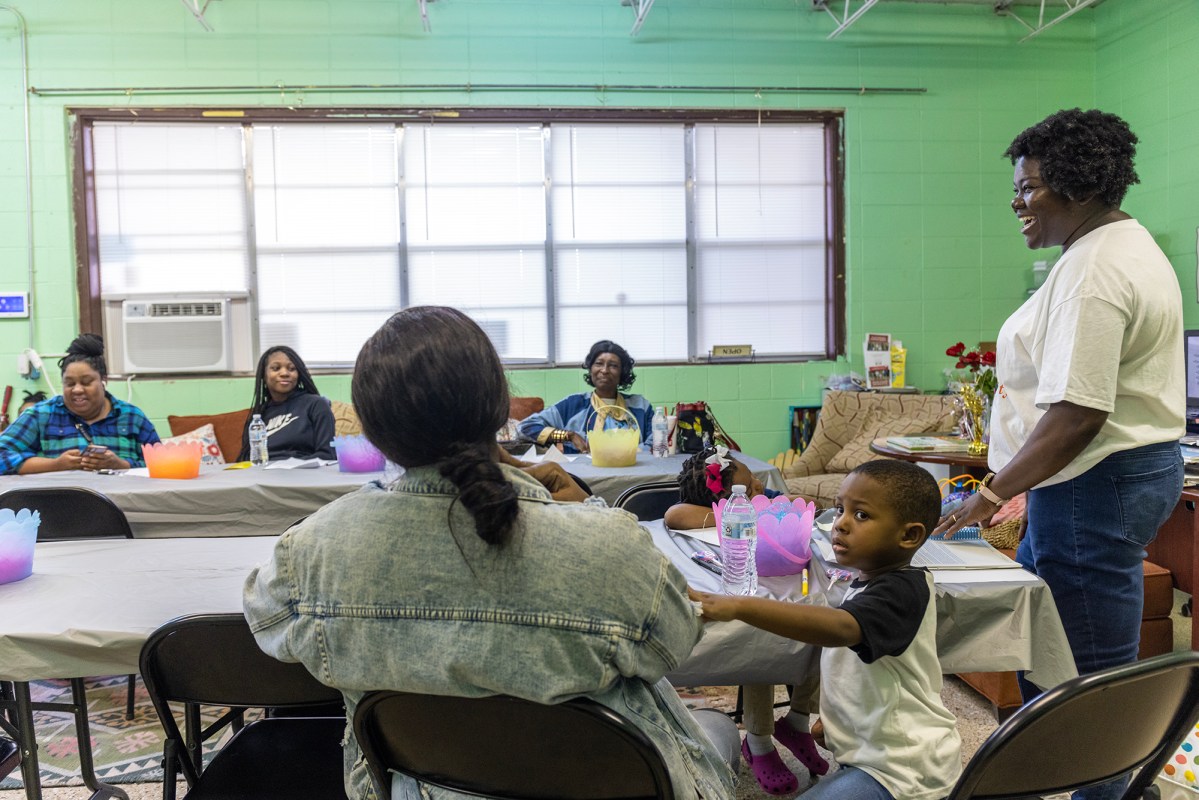Mississippi Today
At Baby U, Delta parents find a support network that goes beyond parenting lessons


At Baby U, Delta parents find a support network that goes beyond parenting lessons
Destiny Miles of Clarksdale felt more alone than ever.
She was pregnant. She had just ended a toxic relationship with the baby’s father. And she felt lost aboutthe idea of parenting.
“At the beginning of my pregnancy, I was very depressed,” said Miles, 22. “Knowing I had to be a single mom, it took a toll on me for a minute.”
She was scrolling Facebook when she stumbled upon parenting classes under the name “Baby U.” That’s how she met Chelesa Presley, who not only changed her outlook on parenting and motherhood, but her life.
“I feel like Miss Presley helped me more than family,” said Miles, who is now eight months pregnant.
Presley is the director of Clarksdale Baby University – often called ‘Baby U’ – a free eight-week parenting class for families with children under 3 years old in the Delta, the most rural region of the state.
Families in Clarksdale are often trying to make do with less. Nearly 42% of its residents live in poverty, and the median household income is about $30,700 per year, according to U.S. Census Bureau data. Coahoma County and the Delta at large have rates of teen pregnancy that surpass the national average.

In a region that’s already spread out and lacking resources, Baby U has provided a stable community for new parents since 2014. But during the pandemic, a lot of the personal touches of the program were strained because classes were online only.
The program only started back in-person at the beginning of this year, and Miles was in that cohort. The appetite for in-person, hands-on instruction was obvious, according to Presley. This last session of 15 families was the first time ever that everyone who started the program on day one made it to each class and to graduation.
“What this class provides, a lot of families in the Delta do not get,” Presley said. “It’s nonjudgmental parenting support. A lot of (other) programs come from a model – whether they realize it or not – that the parents are deficient.”
Presley said parenting classes can often take an approach of “what’s wrong with you” rather than “let’s support you on your parenting journey to have the best outcome for every child.”
Graduates have told Presley the class made them feel valued, and that they needed to learn, but weren’t a bad parent. They needed that affirmation.
Miles went into the classes feeling like she wasn’t ready to be a mom. She doesn’t feel like that anymore.
She has learned about safe sleep, breastfeeding, childhood brain development, nutrition, and how to appropriately discipline – rather than just punish – a child.
Baby U is part of Clarksdale-based nonprofit Spring Initiative, which is funded by donations and grants. Spring Initiative aims to help children in the Delta succeed in school and life. Baby U specifically gets the bulk of its support from the Coahoma County Early Learning Collaborative, which receives money from a state pre-K tax credit program.
Bianca Zaharescu, the CEO of Spring Initiative, said Baby U is different from most of its other programs because it’s not following children from pre-K to graduation, but helping build a foundation before the child reaches the classroom.
“Participants feel so much it’s a safe space where they can really share and talk personally and openly,” Zaharescu said. “It’s not like throwing a bunch of information at parents, it’s a communal relationship-based space where you can explore together. It’s about enjoying parenthood.”

Parents who already have young children were able to bring them to the class. That helped future parents like Miles see parent-child dynamics at work.
They even practiced reading stories aloud. Miles has continued reading to her belly at home, as she waits for her quickly approaching due date.
When she gives birth, Presley will visit Miles in the hospital and put a special “Baby U” hang tag on her door, a beloved tradition. During the class, Presley also does home visits with each family participating. She does follow-ups months later.
The Delta has a shortage of pediatricians, so Presley steps in where she can. She’s trained to do development screenings to make sure Baby U babies are hitting milestones and helps families access specialists if needed.
She’s also an intermediary for mental health needs. She checks with new mothers to make sure they’re not experiencing postpartum depression. If they are, she knows how to get them in touch with the help they need.
More than 77% of Coahoma County is Black and so are most of Presley’s students. Mississippi is known for being one of the worst states for racial health outcome disparities. So, Presley steps up in hopes of guiding new mothers and their kids away from any pitfalls.
Presley has been with the program since 2014 and took over as its director in 2018. She fills gaps and acts as a lifeline many families struggling with finances and health care access wouldn’t have otherwise.
She removes all the barriers she can to get people inside her lime-green classroom on C. Ritchie Avenue. No car? Someone will pick you up. The program provides a full dinner for the participants and their young children when they meet every Monday night over the eight-week session – a draw in itself.

“We talk about life and actual practical things in their life,” Presley said. “My whole thing is, if the mom is not well or the dad is not well, they can’t expect the child to be well.”
Presley said she’s always working to enlist fathers to attend the program – and she makes sure the ones who do participate understand the active role they should have in parenting, even during their partner’s pregnancy.
Miles says friends who once judged her for seeking out parenting classes are asking how they can get involved.
“I told myself if you get in that class, you learn,” Miles said. “You’re not just coming for the free Pampers.”
Now as a proud graduate, Miles gives her friends the same advice: to join and be ready to engage.
She wants to keep in touch with her classmates, a group of like-minded and supportive parents who have become part of a community network she didn’t have just over two months ago.
At the beginning of April, a new eight-week session began.
A handful of mothers, mostly under 25, filed into folding chairs. At first, the group was quiet and reserved.
But Presley is an expert at getting her new classes to open up. Her energy is contagious, even as she asks for each parent to introduce themselves – a game including paper airplanes – or speaks about what to expect in the third trimester.
Soon there was chatter, smiles and the beginnings of a budding support network for another group of young parents.
Mississippi Today photographer Eric Shelton contributed to this report.
This article first appeared on Mississippi Today and is republished here under a Creative Commons license.
Did you miss our previous article…
https://www.biloxinewsevents.com/fitness-trainer-says-former-gov-bryant-directed-welfare-funded-project-sues-for-emotional-distress/
Mississippi Today
On this day in 1939, Billie Holiday recorded ‘Strange Fruit’

April 20, 1939

Legendary jazz singer Billie Holiday stepped into a Fifth Avenue studio and recorded “Strange Fruit,” a song written by Jewish civil rights activist Abel Meeropol, a high school English teacher upset about the lynchings of Black Americans — more than 6,400 between 1865 and 1950.
Meeropol and his wife had adopted the sons of Julius and Ethel Rosenberg, who were orphaned after their parents’ executions for espionage.
Holiday was drawn to the song, which reminded her of her father, who died when a hospital refused to treat him because he was Black. Weeks earlier, she had sung it for the first time at the Café Society in New York City. When she finished, she didn’t hear a sound.
“Then a lone person began to clap nervously,” she wrote in her memoir. “Then suddenly everybody was clapping.”
The song sold more than a million copies, and jazz writer Leonard Feather called it “the first significant protest in words and music, the first unmuted cry against racism.”
After her 1959 death, both she and the song went into the Grammy Hall of Fame, Time magazine called “Strange Fruit” the song of the century, and the British music publication Q included it among “10 songs that actually changed the world.”
David Margolick traces the tune’s journey through history in his book, “Strange Fruit: Billie Holiday and the Biography of a Song.” Andra Day won a Golden Globe for her portrayal of Holiday in the film, “The United States vs. Billie Holiday.”
This article first appeared on Mississippi Today and is republished here under a Creative Commons Attribution-NoDerivatives 4.0 International License.![]()
Mississippi Today
Mississippians are asked to vote more often than people in most other states

Not long after many Mississippi families celebrate Easter, they will be returning to the polls to vote in municipal party runoff elections.
The party runoff is April 22.
A year does not pass when there is not a significant election in the state. Mississippians have the opportunity to go to the polls more than voters in most — if not all — states.
In Mississippi, do not worry if your candidate loses because odds are it will not be long before you get to pick another candidate and vote in another election.
Mississippians go to the polls so much because it is one of only five states nationwide where the elections for governor and other statewide and local offices are held in odd years. In Mississippi, Kentucky and Louisiana, the election for governor and other statewide posts are held the year after the federal midterm elections. For those who might be confused by all the election lingo, the federal midterms are the elections held two years after the presidential election. All 435 members of the U.S. House and one-third of the membership of the U.S. Senate are up for election during every midterm. In Mississippi, there also are important judicial elections that coincide with the federal midterms.
Then the following year after the midterms, Mississippians are asked to go back to the polls to elect a governor, the seven other statewide offices and various other local and district posts.
Two states — Virginia and New Jersey — are electing governors and other state and local officials this year, the year after the presidential election.
The elections in New Jersey and Virginia are normally viewed as a bellwether of how the incumbent president is doing since they are the first statewide elections after the presidential election that was held the previous year. The elections in Virginia and New Jersey, for example, were viewed as a bad omen in 2021 for then-President Joe Biden and the Democrats since the Republican in the swing state of Virginia won the Governor’s Mansion and the Democrats won a closer-than-expected election for governor in the blue state of New Jersey.
With the exception of Mississippi, Louisiana, Kentucky, Virginia and New Jersey, all other states elect most of their state officials such as governor, legislators and local officials during even years — either to coincide with the federal midterms or the presidential elections.
And in Mississippi, to ensure that the democratic process is never too far out of sight and mind, most of the state’s roughly 300 municipalities hold elections in the other odd year of the four-year election cycle — this year.
The municipal election impacts many though not all Mississippians. Country dwellers will have no reason to go to the polls this year except for a few special elections. But in most Mississippi municipalities, the offices for mayor and city council/board of aldermen are up for election this year.
Jackson, the state’s largest and capital city, has perhaps the most high profile runoff election in which state Sen. John Horhn is challenging incumbent Mayor Chokwe Antar Lumumba in the Democratic primary.
Mississippi has been electing its governors in odd years for a long time. The 1890 Mississippi Constitution set the election for governor for 1895 and “every four years thereafter.”
There is an argument that the constant elections in Mississippi wears out voters, creating apathy resulting in lower voter turnout compared to some other states.
Turnout in presidential elections is normally lower in Mississippi than the nation as a whole. In 2024, despite the strong support for Republican Donald Trump in the state, 57.5% of registered voters went to the polls in Mississippi compared to the national average of 64%, according to the United States Elections Project.
In addition, Mississippi Today political reporter Taylor Vance theorizes that the odd year elections for state and local officials prolonged the political control for Mississippi Democrats. By 1948, Mississippians had started to vote for a candidate other than the Democrat for president. Mississippians began to vote for other candidates — first third party candidates and then Republicans — because of the national Democratic Party’s support of civil rights.
But because state elections were in odd years, it was easier for Mississippi Democrats to distance themselves from the national Democrats who were not on the ballot and win in state and local races.
In the modern Mississippi political environment, though, Republicans win most years — odd or even, state or federal elections. But Democrats will fare better this year in municipal elections than they do in most other contests in Mississippi, where the elections come fast and often.
This article first appeared on Mississippi Today and is republished here under a Creative Commons Attribution-NoDerivatives 4.0 International License.
Mississippi Today
On this day in 1977, Alex Haley awarded Pulitzer for ‘Roots’

April 19, 1977

Alex Haley was awarded a special Pulitzer Prize for “Roots,” which was also adapted for television.
Network executives worried that the depiction of the brutality of the slave experience might scare away viewers. Instead, 130 million Americans watched the epic miniseries, which meant that 85% of U.S. households watched the program.
The miniseries received 36 Emmy nominations and won nine. In 2016, the History Channel, Lifetime and A&E remade the miniseries, which won critical acclaim and received eight Emmy nominations.
This article first appeared on Mississippi Today and is republished here under a Creative Commons Attribution-NoDerivatives 4.0 International License.![]()
-

 News from the South - Alabama News Feed6 days ago
News from the South - Alabama News Feed6 days agoFoley man wins Race to the Finish as Kyle Larson gets first win of 2025 Xfinity Series at Bristol
-

 News from the South - Alabama News Feed6 days ago
News from the South - Alabama News Feed6 days agoFederal appeals court upholds ruling against Alabama panhandling laws
-

 News from the South - Arkansas News Feed7 days ago
News from the South - Arkansas News Feed7 days agoTwo dead, 9 injured after shooting at Conway park | What we know
-

 News from the South - Missouri News Feed3 days ago
News from the South - Missouri News Feed3 days agoDrivers brace for upcoming I-70 construction, slowdowns
-

 News from the South - North Carolina News Feed5 days ago
News from the South - North Carolina News Feed5 days agoFDA warns about fake Ozempic, how to spot it
-

 News from the South - Virginia News Feed5 days ago
News from the South - Virginia News Feed5 days agoLieutenant governor race heats up with early fundraising surge | Virginia
-

 News from the South - Oklahoma News Feed4 days ago
News from the South - Oklahoma News Feed4 days agoThursday April 17, 2025 TIMELINE: Severe storms Friday
-

 Mississippi Today3 days ago
Mississippi Today3 days agoSee how much your Mississippi school district stands to lose in Trump’s federal funding freeze

















































